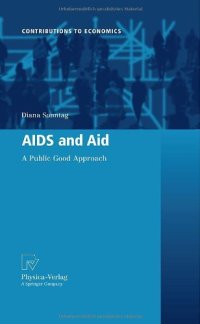
Ebook: AIDS and Aid: A Public Good Approach
Author: Diana Sonntag (auth.)
- Genre: Economy
- Tags: Public Finance & Economics, Development Economics, Health Promotion and Disease Prevention
- Series: Contributions to Economics
- Year: 2010
- Publisher: Physica-Verlag Heidelberg
- Edition: 1
- Language: English
- pdf
The unfolding tragedy of the AIDS epidemic is an instance where a disease with local origins has created consequences worldwide. Todd Sandler (2001a) Health concerns are ?rmly embedded in the developing world. Conditions of poverty like inadequate health infrastructures and sanitation, limited access to treatment of diseases etc. have increased the susceptibility to diseases. However, there is an increasing awareness that health problems of the poor cross national borders and, hence, affect the well-being of people globally. Of all the health crises originating from the developing world the HIV/AIDS epidemic does not only seem to be the largest humanitarian concern but also possesses major economic, de- graphical and social consequences. AIDS could cause even bigger consequences in the future if the spread of HIV is not stopped. The international community has recognised this necessity by determining the 1 ?ght against AIDS as one of the eight Millennium Development Goals (MDGs ).
The emerging outlook on the AIDS crisis is bleak; it seems that Millennium Development Goal 6 cannot be achieved in most developing countries by 2015. While most books look at the HIV/AIDS epidemic from an epidemiological point of view, this work evaluates AIDS and the international financing mechanisms of aid from a public good perspective. In contrast to the standard approach of the academic literature on AIDS, which derives policy recommendations from the demand side, this book explicitly considers the supply side. The study does not only advance the public goods literature, it also provides new insights into the effectiveness of international policies and paves the way for policy recommendations. As it reveals the weaknesses of current anti-HIV policies, a more effective allocation of international assistance is postulated.